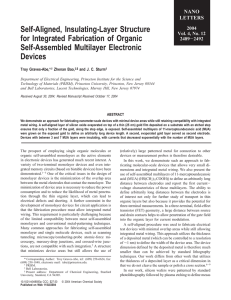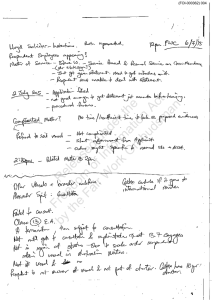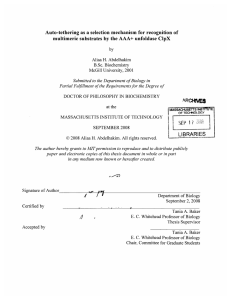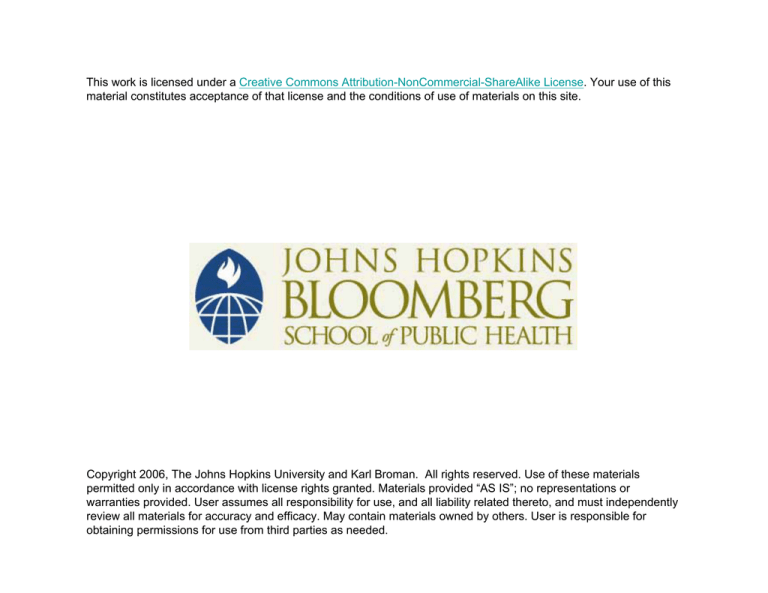
This work is licensed under a Creative Commons Attribution-NonCommercial-ShareAlike License. Your use of this
material constitutes acceptance of that license and the conditions of use of materials on this site.
Copyright 2006, The Johns Hopkins University and Karl Broman. All rights reserved. Use of these materials
permitted only in accordance with license rights granted. Materials provided “AS IS”; no representations or
warranties provided. User assumes all responsibility for use, and all liability related thereto, and must independently
review all materials for accuracy and efficacy. May contain materials owned by others. User is responsible for
obtaining permissions for use from third parties as needed.
Homework for lecture 16
Page 1 of 2
Statistics for laboratory scientists
Homework problems for lecture 16
1. Consider data on the treatment response of 12 mice from strain A
and 9 mice from strain B.
Strain
A:
Strain
B:
55.2 58.1 41.7 44.9 44.8 48.9
sample
mean =
48.15
47.5 48.1 48.4 51.6 40.6 48.0
sample SD
=
5.06
48.7 52.6 65.2 70.4 44.2 54.7
sample
mean =
55.90
44.0 66.5 56.8
sample SD
=
9.70
Assume that the measurements from strain A are independent draws
from a normal distribution with mean muA and SD sigmaA, and that
the the measurements from strain B are independent draws from a
normal distribution with mean muB and SD sigmaB.
Test the hypothesis H0: muA = muB versus the alternative Ha:
muA != muB. (By "!=", I mean "not equal to".).
a. Calculate the P-value for the test.
b. What do you conclude?
2. Repeat the above problem for the one-tailed test of H0: muA =
muB versus the alternative Ha: muA < muB
3. Consider data for some measurement on 6 mice before and after
some treatment.
Mouse
1
2
3
Before
81
101 76
4
5
6
67
125 144
http://www.biostat.jhsph.edu/~kbroman/teaching/labstat/third/hw16.html
3/31/2006
Homework for lecture 16
After
Page 2 of 2
138 210 162 105 259 319
Difference 57
109 86
38
134 175
Does the treatment have an effect? Assume that the differences are
independent draws from a normal distribution with mean mu and SD
sigma.
Test the hypothesis H0: mu = 0 versus the alternative Ha: mu !
= 0.
a. Calculate the P-value for the test.
b. What do you conclude?
[ 3rd term syllabus | 4rd term syllabus | R for
Windows ]
Last modified: Sun Feb 26 00:14:08
EST 2006
http://www.biostat.jhsph.edu/~kbroman/teaching/labstat/third/hw16.html
3/31/2006


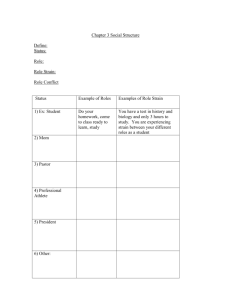
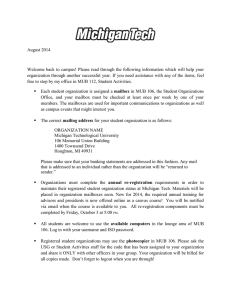
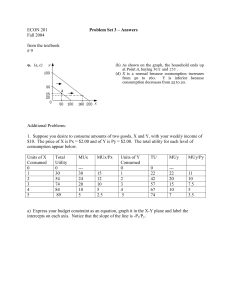

![[H3 Theme 1.1.1] Rational DM Slides](http://s2.studylib.net/store/data/026068243_1-4c65fb42fd8c76263ff9b35a88a687b2-300x300.png)

